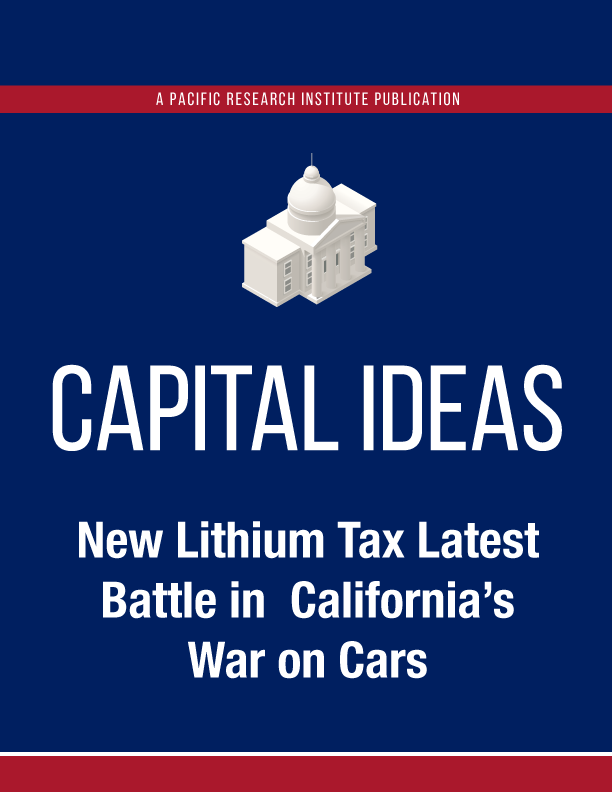California’s 2022 budget includes a tax on lithium, which is necessary for building electric vehicle batteries. It’s almost as if policymakers aren’t as interested in forcing people into electric vehicles as they are pushing them out of cars altogether.
The flat-rate tax, which goes into effect in January, is directed at lithium pulled from the Salton Sea, one of the largest lithium sources in the country. Because it will increase the cost of building EVs, which need the metal for their batteries, the tax will inevitably add to their sticker price, taking them out of the affordable range of even more Californians.
The tax will impact manufacturing, as well, making it less attractive to capital. Teslarati, which calls itself “the #1 source of news for everything Tesla, SpaceX, Electric Vehicles, and Elon Musk,” reports that “players in the battery industry” believe “the tax could scare off potential clients.”
One, Controlled Thermal Resources Ltd from Imperial Valley, says the lithium tax will put the company in the position to miss deadlines for delivering “key battery components to electric vehicle makers like General Motors in 2024 and Stellantis NV the year after.”
Another, EnergySource Minerals, a San Diego mining company, says “its discussions with potential financiers and an automaker have been halted due to the lithium tax.”
The industry’s appeals, however, were ignored by lawmakers, who want to make it more costly to mine the Salton Sea, even though it “could produce the world’s greenest lithium.” How odd, since being greener tomorrow than we are today is central to the California way.
So let’s see if we have this right: Thanks to Gov. Gavin Newsom’s 2020 executive order, EVs will be the only option for buying new cars in California starting in 2035, but the lithium tax is likely to make EVs affordable to fewer buyers as it will cause the prices of the only new cars allowed on the market to rise.
Even before California’s lithium tax there were clear signs that EV prices were headed beyond the financial means of many. The Wall Street Journal reported in 2020 that Toyota President Akio Toyoda considered electric vehicles to be “overhyped” and argues that “converting entirely to EVs could cost hundreds of billions of dollars and make cars unaffordable for average people.”
Makes it hard to argue that there’s not a war on cars in this state, doesn’t it?
Of course manufacturers can buy lithium elsewhere, such as China, which controls the largest share of the global market, and might very well be using slave labor to extract minerals used to build batteries. They can also buy from other nations, where environmental guidelines – when they exist at all – are often treated as suggestions.
The lithium tax, though, is just the most recent skirmish in the war on cars, which began nearly a half century ago. Other battles include:
California’s “road diet,” an effort to “halt attempts to expand or improve our roads, even when improvements have been approved by voters,” says Joel Kotkin, the Chapman University professor who coined the phrase, so as to “make life worse for most Californians, since nearly 85% of us use a car to get to work.”
Reducing available parking spaces to change “urban residents’ transportation behavior.”
Closing lanes, and sometimes entire streets, to automobile traffic.
Converting car lanes to bus and bicycle lanes.
Diverting revenues from motor fuel taxes, the highest in the country, to projects unrelated to vehicle traffic.
Any comparison between automobiles and public transportation shows that the former are without question superior. Cars, says Pepperdine University economics professor Gary Galles, allow us to make direct rather meandering public transit trips; provide opportunities to change schedules even while driving; save time; “have far better multi-stop trip capability” than transit; and “offer a safer, more comfortable, more controllable environment.”
Cars also expand “access to jobs and educational opportunities, increase productivity and incomes, improve purchasing choices, lower consumer prices and widen social options,” says Galles.
Should the generals waging California’s war on cars win, and they have every intent to vanquish their enemy, the losers will have their lives diminished, taken back to a time before automobiles introduced freedom and convenience to more people than any of history’s inventions.
Yet the politics of California say we have to be packed into public transit no matter its many disadvantages. Maybe this is because moving families and businesses out of the state, as so many have and so many plan to do, is a bit harder by bus.
Kerry Jackson is a fellow with the Center for California Reform at the Pacific Research Institute.


